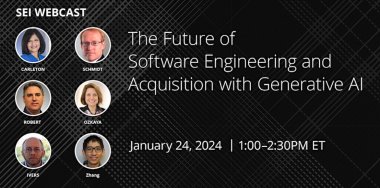The Future of Software Engineering and Acquisition with Generative AI
We stand at a pivotal moment in software engineering, with artificial intelligence (AI) playing a crucial role in driving approaches poised to enhance software acquisition, analysis, verification, and automation. While generative AI tools initially sparked excitement for their potential to reduce errors, scale changes effortlessly, and drive innovation, concerns have emerged. These concerns encompass security risks, unforeseen failures, and issues of trust. Empirical research on generative AI development assistants reveals that productivity and quality gains depend not only on the sophistication of tools but also on task flow redesign and expert judgment.
In this webcast, Software Engineering Institute (SEI) researchers will explore the future of software engineering and acquisition using generative AI technologies. They’ll examine current applications, envision future possibilities, identify research gaps, and discuss the critical skill sets that software engineers and stakeholders need to effectively and responsibly harness generative AI’s potential. Fostering a deeper understanding of AI’s role in software engineering and acquisition accentuates its potential and mitigates its risks.
What Attendees Will Learn
- how to identify suitable use cases when starting out with generative AI technology
- the practical applications of generative AI in software engineering and acquisition
- how developers and decision makers can harness generative AI technology
Speaker and Presenter Information
Anita Carleton is an Executive Leadership Team Member and Division Director of the Software Solutions Division at Carnegie Mellon University’s (CMU’s) SEI, with more than 35 years of technical and senior leadership experience in the software engineering industry. Carleton has most recently led a national study engaging the global software engineering community to define a vision, strategy/national priorities, and roadmap for software engineering research and development titled, Architecting the Future of Software Engineering: A National Agenda for Software Engineering Research & Development. Her seminal research in applying statistical process control techniques to the U.S. Space Shuttle software data led to Carleton co-authoring the book, Measuring the Software Process: Statistical Process Control for Software Process Improvement. Her bachelor’s degree is in applied mathematics from CMU and her MBA is from the MIT Sloan School of Management. Carleton serves on the Institute of Electrical and Electronics Engineers (IEEE) Software Advisory Board and is an IEEE Fellow.
Dr. Doug Schmidt is a Cornelius Vanderbilt Professor of Engineering, the Associate Provost of Research Development and Technologies, the Co-Director of the Data Science Institute, and a Senior Researcher at the Institute for Software Integrated Systems, all at Vanderbilt University. He is also a visiting scientist at the SEI at CMU. Dr. Schmidt is an internationally renowned and widely cited researcher whose work focuses on pattern-oriented middleware, Java concurrency and parallelism, and generative AI.
John Robert is a Principal Engineer at the SEI and the Deputy Director for the SEI’s Software Solutions Division. Robert provides leadership for software engineering research and the development of technologies in partnership with Department of Defense (DoD) programs and industry to enable the broad transition of new software engineering approaches. Robert has led multiple SEI technical partnerships with high-priority DoD programs, resulting in high customer value and beneficial connections to SEI research.
Dr. Ipek Ozkaya is a principal researcher and the technical director of the Engineering Intelligent Software Systems group at the SEI. Her areas work include software architecture, software design automation, and managing technical debt in software-reliant and AI-enabled systems. At the SEI, she has worked with several government and industry organizations in domains including avionics, power and automation, Internet of Things (IoT), healthcare, and information technology (IT). Ozkaya is the co-author of a practitioner book titled, Managing Technical Debt Reducing Friction in Software.
James Ivers is a Principal Engineer and lead of the Architecture Design, Analysis, and Automation group at the SEI. His experience spans research and application of work in software architecture, code analysis, formal methods, and scaling our ability to evolve software. His most recent work focuses on using artificial intelligence (AI) for software engineering to support large-scale refactoring.
Shen Zhang is a Senior Software Engineer within the Enabling Mission Capability at Scale directorate at the SEI. He provides expertise in software development processes and static code analysis for real-time mission critical software-intensive systems in the Air Force and Navy. More recently, he has been involved with using large language models to accelerate software engineering use cases. Prior to working at the SEI, he developed simulation products for industrial control systems in the commercial power industry.
Relevant Government Agencies
Intelligence Agencies, DOD & Military, Office of the President (includes OMB), Dept of Commerce, Dept of Education, Dept of Energy, Dept of Health & Human Services, Dept of Homeland Security, Dept of Labor, Dept of State, Dept of Treasury, Dept of Veterans Affairs, Other Federal Agencies, State Government, County Government, City Government, FEMA, Office of Personnel Management, Federal Government
Event Type
Webcast
This event has no exhibitor/sponsor opportunities
When
Wed, Jan 24, 2024, 1:00pm - 2:30pm
ET
Cost
Complimentary: $ 0.00
Website
Click here to visit event website
Organizer
CMU - SEI






